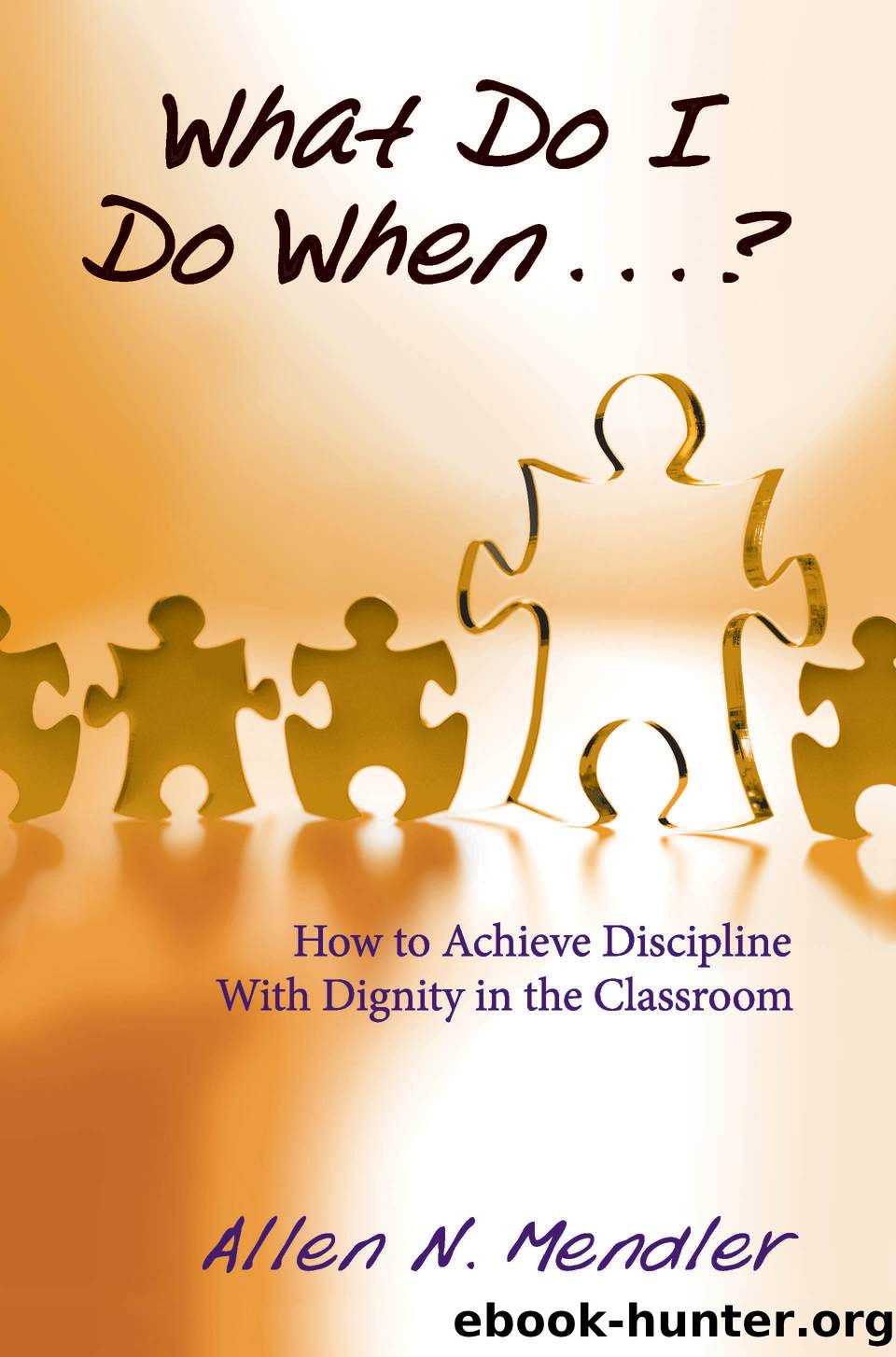What Do I Do When...? by Mendler Allen;

Author:Mendler, Allen;
Language: eng
Format: epub
Publisher: Solution Tree Press
Published: 2007-08-15T00:00:00+00:00
* My thanks to the teacher who prepared this examination, and my regrets for having misplaced her name so that I cannot properly credit her for her work.
5 Dealing With Power Struggles
Prevention is the most effective form of discipline. We have found over and over that those teachers who attend to the basic needs that drive behavior, and build their classrooms in need-satisfying ways, have fewer discipline problems throughout the year. Even in the best of circumstances, there are children who test the limits, and are uncooperative and unmoved, despite your best efforts. In most instances, when rules are broken, the best way of responding is with privacy, eye contact, and proximity (P.E.P.). If the teacher is close, quiet, and direct, most children will readily accept a consequence. When a child will not, however, I have found de-escalation the best way of dealing with this.
While there are no ready-made steps or exact sequences by which to measure your response, a sequence similar to the following may help you frame a reasonably comfortable way of dealing with these moments. Most of us can become easily unnerved and quickly angered when children challenge our authority in front of the class. These âWhat are you going to do about it?â moments can be tense and uncertain. We all need short-term, effective, and dignified things to say and do when a student becomes challenging or simply refuses to accept a reasonable consequence.
Let us assume that Luis is a student in Mrs. Hernandezâs class. He has been talking when others are talking and has been playfully slapping Henry in the head, disrupting Henryâs learning and Mrs. Hernandezâs teaching, as well as distracting others. Mrs. Hernandez has reminded and warned to no avail. She decides that planning might be an effective consequence and delivers this consequence with P.E.P. She tells Luis, âIâll see you after school today so that we can work together on a plan to stop hitting and to raise your hand when you want to be recognized.â
Luis says loudly so that many in the class hear, âI canât come today after school. Iâm busy.â
This scenario represents the first moves in a no-win power struggle. Most teachers, when faced with a studentâs defiance, either escalate the stakes or withdraw. Neither of these options is either dignified or effective. Let us see why.
If Mrs. Hernandez says, âYouâre staying. You should have thought about that before you broke the rules for the fifth time today,â Luis has two choices: 1) He can back down and yield, and feel resentful in the process. This choice probably will make him look for another opportunity to attack, perhaps more sneakily. 2) He can decide to further the challenge by whispering under his breath or by brazenly continuing with a âTry and make meâ frontal assault. If the challenge continues, it will escalate rapidly and result in a visit to the principalâs office. Neither side has won because unless it is June, there is always later today, tomorrow, or next week when that student will be back.
Download
This site does not store any files on its server. We only index and link to content provided by other sites. Please contact the content providers to delete copyright contents if any and email us, we'll remove relevant links or contents immediately.
Deep learning with TensorFlow and Keras by Derrick mwiti(891)
Understanding PDA Autism in Kids: A Guide for Parents and Teachers to Support Neurodiverse Learners by Jehu Len(801)
The Victorian Era: A Captivating Guide to the Life of Queen Victoria and an Era in the History of the United Kingdom Known for Its Hierarchy-Based Social Order by Captivating History(592)
Writing Solid Code: Development Philosophies for Writing Bug-Free Programs by Steve Maguire(519)
Intersectionality in Educational Research by Dannielle Joy Davis; James L. Olive; Rachelle J. Brunn-Bevel; Susan R. Jones(496)
100 Ideas for Secondary Teachers: Engaging Parents by Janet Goodall & Kathryn Weston(494)
How to be assertive in any situation by Hadfield Sue & Hasson Gill(488)
Brain Teasers to Build Critical Thinking Skills: Brain Exercises for Tech, Banking, Case Interview Prep, and to Keep Your Mind Sharp by Kris Safarova(475)
Brain Teasers to Build Critical Thinking Skills by Safarova Kris(470)
Python 101 - Fundamentals by Sam(444)
Critical Curriculum Leadership : A Framework for Progressive Education by Rose M. Ylimaki(431)
The Art of Emotional Validation: Improve Your Communication Skills and Transform Your Relationships by Validating Emotions and Feelings by Emily Wright(402)
A Beginner's Guide to SSD Firmware by Unknown(392)
The Knights Templar: An Enthralling History of the Rise and Fall of the Most Influential Catholic Military Order by Wellman Billy(387)
NumPy : From Basic to Advance by bisht Karan Singh(387)
The Future Knowledge Compendium by Ellyard Peter;(381)
What Every Teacher Should Know about Learning, Memory, and the Brain by Tileston Donna E. Walker;(380)
Alma Maters (5th edition) by Unknown(374)
Make wealth from intraday trading by Maddy MADDY(359)
